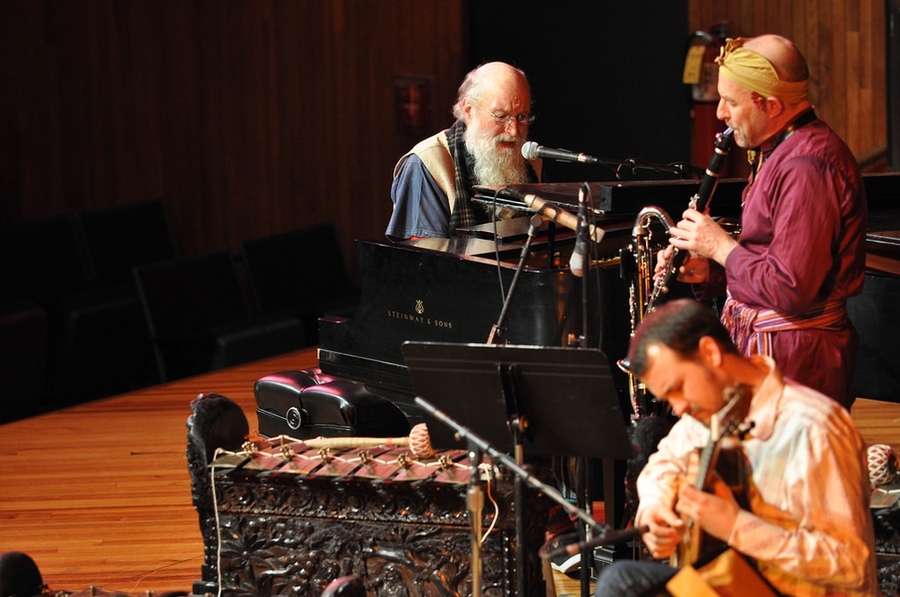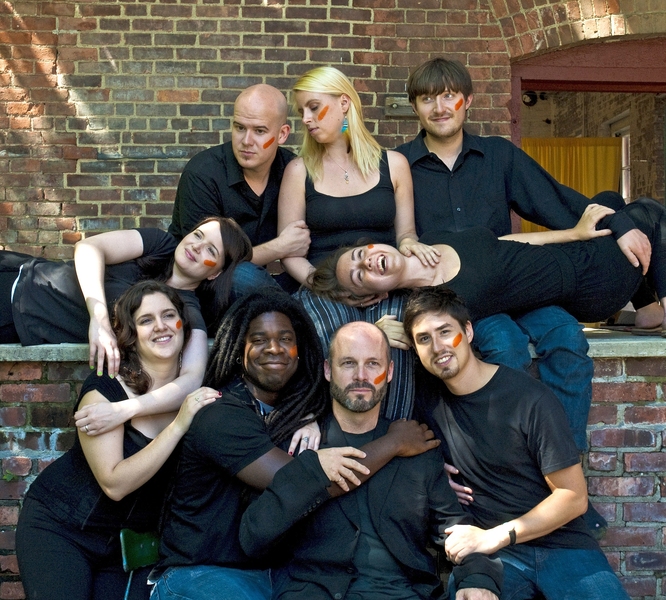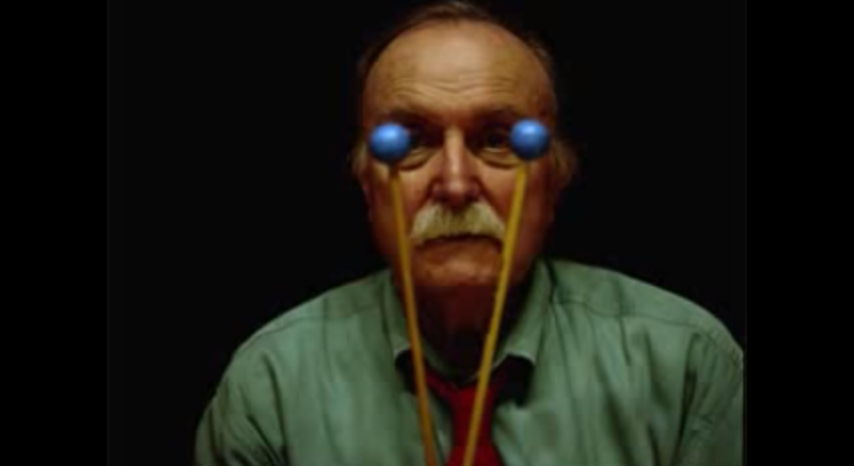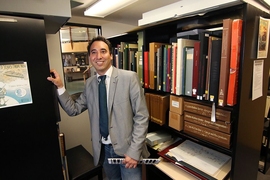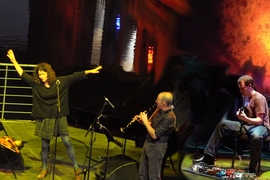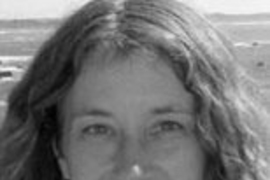This fall, the Massachusetts Institute of Technology is inaugurating an innovative annual performance series called MIT Sounding. The 2014-15 season will be curated by Evan Ziporyn, a professor in the Music and Theater Arts Section, and feature live performances by new music pioneers Alvin Lucier and Terry Riley, early music denizens Boston Camerata, and the Grammy Award-winning ensemble Roomful of Teeth. The series will include world and U.S. premieres by Ziporyn, Elena Ruehr, Christine Southworth, Arnold Dreyblatt, Gyan Riley, and others. MIT Sounding is presented by the MIT Center for Art, Science & Technology (CAST).
Headlining and bookending MIT Sounding for 2014-15 are two éminences grises of experimental music, Alvin Lucier and Terry Riley. “Alvin and Terry both reset the boundaries of what music and music-making could be in an era — the ’60s and ’70s — when many thought experimental music was at a dead end, that there was no way to go except into more abstract, more abstruse directions," Ziporyn says in a recent article in The Boston Globe. “In very different ways, both have extended what it means to do music, what it means to be a performer.”
For more than 50 years, Lucier and Riley have each brought to their music a distinctive, broad-ranging vision and an ever-exploratory approach to technology. Each has composed groundbreaking works that have changed the course of music history, helping to set the stage for future generations. Those new generations are represented by the performers in the series, who reach from 14th-century Italy (Boston Camerata) to 21st-century New York (Roomful of Teeth) and Poland (Małe – “mah-way” – Instrumenty), drawing inspiration from such eclectic sources as Western and Eastern classical music, Dada, the medieval repertory, rock, and Tuvan throat singing. All share a voracious appetite for new musical ideas.
Alvin Lucier, the first composer to sonify brain waves, launches MIT Sounding as part of the MIT CAST Symposium, Seeing / Sounding / Sensing, a two-day dialogue between artists, researchers, and scientists. The symposium culminates on Saturday, Sept. 27, in a concert of music by Lucier and Arnold Dreyblatt, featuring Lucier himself performing the Boston premiere of the live version of his 1969 "I Am Sitting In A Room."
MIT Sounding’s season concludes on April 18, 2015, with a marathon celebration of Terry Riley’s 80th birthday. This four-hour concert will include the premiere of another reimagined classic, a multi-saxophone live version of Riley’s 1969 "Poppy Nogood and the Magic Band," newly arranged by Evan Ziporyn. Riley himself will perform solo and in collaboration with Gamelan Galak Tika and Eviyan, and pianist Sarah Cahill (also featured in her own recital on Nov. 16) will perform new works composed in homage to Riley, including world premieres by Gyan Riley and Christine Southworth.
Twice in the series, the esteemed Boston Camerata, celebrating its 60th season, will perform newly discovered renaissance and medieval works. Some pieces date back six centuries, and were reconstructed using techniques and software developed by MIT musicologist Michael Cuthbert. Performances by the Boston Camerata will take place on Feb. 28 and March 6.
Grammy Award-winner Roomful of Teeth mines the expressive potential of the most basic instrument – the human voice. The group premieres a new one-act opera by Guggenheim-winning MIT composer Elena Ruehr, as well as new works by MIT and other composers on Nov. 21.
MIT Sounding — an annual series — is presented by MIT, with support from the Center for Art, Science & Technology; the School of Humanities, Arts & Social Sciences; and the Music & Theater Arts program. A full schedule and information about the musicians is below. Tickets and updated information can be found at arts.mit.edu/sounding.
MIT Sounding schedule
Note: Events take place on the MIT campus and times/locations are subject to change. Please check arts.mit.edu/sounding for updated event information.
September 27, 2014 | 7:00 pm
MIT Media Lab, Building E14 (6th Floor), 75 Amherst Street, Cambridge, Mass.
Alvin Lucier: "I Am Sitting in a Room" (Live) (Boston premiere); also "In Memoriam Jon Higgins" and a performance of "Spin Ensemble" by MIT Visiting Artist Arnold Dreyblatt
November 16, 2014 | 4:00 pm
MIT Killian Hall, Building 14W, 160 Memorial Drive, Cambridge, Mass.
Sarah Cahill, piano: world premiere of Evan Ziporyn’s "Terry Tunes"; also works by Terry Riley, Yoko Ono, and others
November 21, 2014 | 8:00 pm
MIT Kresge Auditorium, Building W16, 48 Massachusetts Avenue, Cambridge, Mass.
Roomful of Teeth: world premiere of Elena Ruehr’s "Cassandra in the Temples"; also works by Evan Ziporyn/Christine Southworth and others
January 9, 2015 | 5:00-8:00 pm
MIT Museum, Building N51, 265 Massachusetts Avenue, Cambridge, Mass.
Pawel Romanczuk: "Małe Instrumenty (Small Instruments)"; part of the MIT Museum’s Second Fridays program series
February 28, 2015 | 8:00 pm
MIT Chapel, Building W15, 48 Massachusetts Avenue, Cambridge, Mass.
Boston Camerata: "Portes du Ciel"
March 6, 2015 | 8:00 pm
MIT Walker Memorial Building, Building 50, 142 Memorial Drive, Cambridge, Mass.
Boston Camerata: "Across the Mountain: Musical Interactions in Medieval Music"
April 18, 2015 | 7:00 pm
MIT Kresge Auditorium, Building W16, 48 Massachusetts Avenue, Cambridge, Mass.
Terry Riley’s 80th Birthday with Terry Riley, Eviyan, Gamelan Galak Tika, Sarah Cahill, and the world premiere of all-live "Poppy Nogood and the Phantom Band"
About the musicians
Headlining MIT Sounding, legendary composer Terry Riley makes his second appearance at MIT for his 80th birthday concert. Riley launched musical minimalism with his revolutionary classic "In C" in 1964, a work whose influence continues to be felt in every corner of the musical world today, from classical concert halls to electronica clubs. Riley has since continued to compose and improvise hypnotic, multi-layered, polymetric, brightly orchestrated Eastern-flavored works that defy categorization. From his early '60s tape loop and trance music experiments and collaborations with La Monte Young, to his study of Hindustani musical traditions and eclectic compositions for the Kronos Quartet and other leading ensembles, Riley is a true musical innovator.
As part of the CAST symposium, Seeing / Sounding / Sensing, Alvin Lucier performs his renowned "I am Sitting in a Room" – live. (The technology did not exist for live performance when he composed the work in 1969.) Almost every Lucier composition includes a “first” — including the use of brain waves in live performance, the generation of visual imagery by sound in vibrating media, and the evocation of room acoustics for musical purposes. Now a professor emeritus at Wesleyan University, Lucier continues to create sound installations and works for solo instruments, chamber ensembles, and orchestra.
Delving deep into the early music repertory, the esteemed Boston Camerata — celebrating its 60th season — enlivens an important chapter of cultural history: the competing centers of France and Italy in the late Middle Ages and early Renaissance. Boston Camerata will work in collaboration with MIT musicologist and programmer Michael Cuthbert, whose open-source software “music21” allows scholars to find patterns and “fill in the gaps” among pieces of music from vast data sets. Their performances at MIT will include the first performance in over 600 years of newly reconstructed works.
Founded in 2009 by Brad Wells, Roomful of Teeth is a vocal octet dedicated to mining the expressive potential of the human voice — from yodeling to Inuit throat singing. Through study with masters from non-classical traditions the world over, the ensemble continually expands its vocabulary of singing techniques and, through an on-going commissioning project, invites today’s brightest composers to create a repertoire without borders. At MIT, Roomful of Teeth collaborates with MIT composer Elena Ruehr on her a cappella opera-in-progress "Cassandra in the Temples," exploring themes of mysticism, disaster, hysteria, and belief in a new interpretation of the apocalyptic Greek myth. In April 2013, ensemble member Caroline Shaw became the youngest composer ever to win the Pulitzer Prize for her "Partita for Eight Voices" — the four movements of which appear on the group’s 2012 debut album, "Roomful of Teeth." In 2014, the ensemble won a Grammy Award for Best Chamber Music/Small Ensemble Performance.
Bay Area pianist, writer and producer Sarah Cahill has commissioned, premiered, and recorded numerous compositions for solo piano. Composers who have dedicated works to her include John Adams, Terry Riley, Frederic Rzewski, Pauline Oliveros, Annea Lockwood, and Evan Ziporyn, and she has also premiered pieces by Lou Harrison, Julia Wolfe, Ingram Marshall, Toshi Ichiyanagi, George Lewis, Leo Ornstein, and many others. Cahill has researched and recorded music by the important early 20th-century American modernists Henry Cowell and Ruth Crawford, and has commissioned a number of new pieces in tribute to their enduring influence. She enjoys working closely with composers, musicologists, and scholars to prepare scores for performance. Recent performances include a concert at San Quentin State Prison of the music Henry Cowell wrote while incarcerated there; Lou Harrison’s Piano Concerto with Steven Schick and the La Jolla Symphony; and Schubert’s “Trout” Quintet at the Yehudi Menuhin Chamber Music Seminar and Festival. She has performed chamber music with the Alexander String Quartet, New Century Chamber Orchestra, the Left Coast Chamber Ensemble, and many other chamber groups.
During the winter session, MIT students will be part of a workshop with Pawel Romanczuk, composer, instrument builder, and founder of Małe Instrumenty (Small Instruments), a five-piece band that explores new sounds using a wide array of small instruments, from toy pianos to homemade child-sized cellos. Inspired by the soundtracks to old Polish animated films, the instruments used in the group’s sonic experiments feature an ever-expanding array of instruments, children’s toys, and strange musical inventions. MIT students will work with Romanczuk to build their own instruments and create their own compositions, presenting their work in a public concert at the end of the residency.
